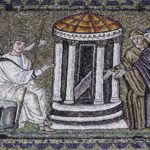We run our website the way we wished the whole internet worked: we provide high quality original content with no ads. We are funded solely by your direct support. Please consider supporting this project.

Love OR Judgment – You Can’t Have Both
Image by Morgan Sessions
We cannot judge others because it is not our place as humans to function as the center—because God is that center—and judge other people. In addition, we cannot judge others because we ourselves are sinners who deserve judgment. If we don’t want to be judged, Jesus says, we must not judge. The measure of the judgment we give is the measure with which we shall be judged.
This is why human judgments are always hypocritical. The act of judging others subjects us to the same judgment we apply to them. The hypocrisy of our judgment is manifested in the fact that it is always selective and self-serving. Because we are trying to fill the vacuum in our spirit with our judgments, we amplify the sins of others while minimizing our own sins.
Jesus teaches the exact opposite (Matt 7). We should consider our own sins to be logs and other people’s sins to be specks. The picture of people with tree trunks sticking out of their eyes looking for dust particles in other people’s eyes is absolutely ludicrous—and that is the point. We are finite, sinful human beings, and as such, we have no business setting ourselves up as the moral police of others, acting as though we know the state of other people’s hearts and concluding that we are in any way superior to them.
While we can discern the impact of behavior, the only conclusion we are allowed to know about a person’s heart is that he or she has infinite worth before God.
In Matthew 7, Jesus is doing nothing less than contrasting two mutually exclusive ways of living. We either live in love, or we live in judgment. The extent to which we do one is the extent to which we do not do the other. If we stand in judgment and do not forgive, we ourselves will be judged and not forgiven (Matt 6:14-15). If we do not show mercy, we will not be given mercy (James 2:13). If we condemn others, we will stand condemned (Luke 6:37).
Conversely, if we die to ourselves as the center and thus die to ourselves as judge, we will receive the life of one who will never be judged. If we accept Christ’s reconciling act and simply have faith that God is who he says he is in Christ, that we are who God says we are in Christ, and that all others are who God says they are in Christ—in other words, if we simply abide in love—then, in fact, all we are is defined in Christ. In Christ there is no judgment (Rom 8:1), for we have entirely opted out of the judgment game created when we lost Paradise.
Recognizing that we can only lose in this game, for we are ourselves sinners, we no longer try to get life by critically evaluating ourselves or others before God. We simply receive, live in, and give the love and mercy of God that has triumphed over judgment.
—Adapted from Repenting of Religion, pages 109-111
Category: General
Tags: Judgment, Living in Love, Love, Repenting of Religion
Topics: Following Jesus
Related Reading

The Revelation of God in the Cross
The cross cannot be understood apart from the resurrection, just as the resurrection can never be understood apart from the cross. They are two sides of the same coin. If you consider the cross apart from the resurrection, then the crucified Christ becomes nothing more than one of the many thousands of people who were…

3 Traits of a Jesus Kind of Church
A Jesus kind of church (See an introductory post on this here) is called to represent God, just as Christ did. The church is Christ continuing to manifest the true God. Bonhoeffer put it this way, “The Church is not a religious community of worshippers of Christ but is Christ Himself who has taken form…

Becoming Like the Accuser
When the Adam and Eve yielded to Satan and surrendered their God-given authority over the earth and animal kingdom (Gen 3), Satan became “the god of this world” (2 Cor. 4:4), the “ruler of the world” (Jn. 12:32; 14:31) and the “principality and power of the air” (Eph. 2:2) who “has power over the whole…

Christus Victor Atonement and Girard’s Scapegoat Theory
Many of the major criticisms of Crucifixion of the Warrior God that have been raised since it was published four weeks ago have come from folks who advocate Rene Girard’s understanding of the atonement. A major place where these matters are being discussed is here, and you are free to join. Now, I have to…

The Distinctive Mark of Jesus Followers
Jesus’ teaching to love our enemies was understandably shocking to his original audience—just as it is to us today. Jesus expected much, which is why, after telling his audience to love their enemies he added that if we only love those who love us and do good those who do good to us, we’re doing…

What the Resurrection Says About the Cross
As with every other aspect of Jesus’ life and ministry, even the resurrection must be understood in light of the cross. This event was not just the resuscitation of a random corpse. It was the resurrection of the Incarnate Son of God who had fulfilled the human side of the God-human covenant by living a sinless…
